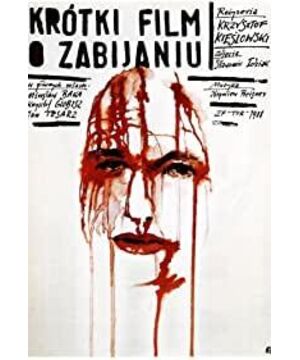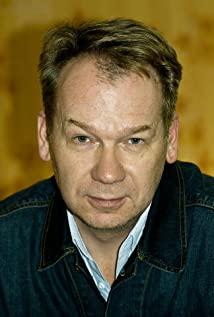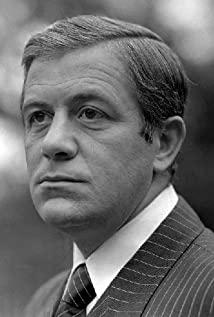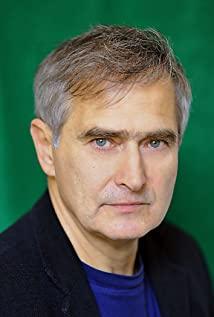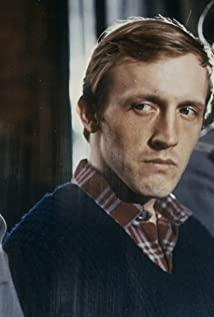Kieslowski, a Polish film director, saw with a keen eye that the anti-intellectual "refusal to think" is the root cause of human beings repeatedly falling into existential predicaments and meaning crises. Due to the lack of inward thinking and self-examination ability, modern individuals tend to be chaotic and ignorant, and become a mechanized existence under the control of the existing background and framework, taking the ordinary as normal, and seeing disorder as order. Everyone is trapped in the quagmire and stagnant; as for the reason for the existence of the "quagmire", the ignorant enjoy it and hate thinking; the numb people are content with the present and avoid thinking in order to protect themselves; those who are confused are suffering, and they use thinking to verify it. The scarcity of truth and the lack of answers.
Keith is undoubtedly one of the more sober and calm among the perplexed. He proved with the feature film "The Ten Commandments" that the useless use of film art lies in coping with perplexities with difficulties, clearing ignorance with incomprehensibility, and restoring reality with fiction. The ten feature films are connected with each other, and from a metaphysical point of view, they reproduce the various ethical and moral dilemmas that bind modern people. The ultimate philosophical question of destiny to arouse the audience's thinking about the predicament and incomprehension itself. Thinking makes individuals temporarily interrupt their daily activities, withdraw from their original thinking comfort zone, and turn into a state of "defamiliarization", re-examining the nature of self and others, human beings and society from a new perspective, and discovering those things that have always existed but have not been The ultimate problem of perception. The "Messenger of God" that travels through each episode is the incarnation of "problem". The camera that embodies the author's will instead of the eyes of the audience and the people in the play noticed the existence of the "Messenger of God", that is, the existence of the ultimate problem. When the messenger is staring at the people in the play, the author is also staring at the audience with alert and guiding eyes, torturing everyone's conscience and soul. There is no answer, only a thought-provoking shock; everything is still unsolved, but the cry of the questioner can be vaguely heard. A potential appeal is penetrating the image and hitting people's hearts - what is terrible is not the predicament, but the indifference to the predicament; what is precious is not the truth, but the pursuit of the truth.
The Ten Commandments: The Short Film of Murder is the most thought-provoking film in the Ten Commandments series. Different from other Nine Commandments, which explore the private life and inner secret areas of ordinary people, "Murder Short Film" moves the camera to the deep and broad picture of Polish society. "In this human social phenomenon, the relationship between characters has also risen from the basic intimate relationship and family relationship to social relationship, and there is a group portrait that is rarely depicted in the series of films. Although the theme of the film has a slight touch with the political topic (the setting of national laws), it does not violate the film shooting concept of "depoliticization". Contradictions that lead to confusion and incomprehension. The author believes that what the film really wants to explain is: in the face of the intractable human inferiority, the rational order of external strength and the fragile modern civilization, any modern law that is fully trusted by human beings will appear empty and ineffective. Although the crux of the crisis can be found from the ancient Christian spirit and humanitarian thought, the awakening and idealistic practice of a few individuals are far from being enough to save the silent and blinded majority and the overall trend of the times. The sword of Damocles above the heads of humans seems to fall at any moment, severing the heads of the swallowing civilization. If human beings want to transcend time and death and achieve self-salvation, they need to look back at themselves more, know themselves, and awaken the wisdom and conscience in their nature. 1. Murder and Sexual Evil
The first half of the film is a three-line juxtaposition of alternate narrative combinations. The three key characters corresponding to the three plot lines gradually move towards the intersection of fate through their own dramatic actions, and eventually become the victims, suspects and victims of the same statutory murder case. Acting as a lawyer, and this led to another murder case - the death penalty of violently depriving the criminal's life in the name of the law. The reason why the level of discussion on the theme of the film goes far beyond the category of "murder cases" and rises to the concept of "universal murder" is because Keith deliberately depicts a world where everyone "does little for good, and does what for evil". Polish society. The author uses the normalization of evil and crime to prove that "murder" is not a criminal crime in the modern legal sense, but a kind of human wickedness, representing all evil deeds aimed at harming others. Individual crime is first and foremost the evil result of group crime, and group crime is a tragedy caused by the evil of human nature.
At the beginning of the film, three gloomy city corners are descriptively displayed - garbage everywhere, sewage flowing, animal corpses everywhere, a stray cat was hanged by a group of bad boys on the street, showing the innate murder of human beings nature. There is no doubt that this is a rotting, chilling, death-smelling city. The urban landscape under the filter effect has a turbid fog, which makes the people and vehicles appear a little confused. The control of the moral machine, but the heart has long been ignorant of what morality is. Even if the security governance is ineffective, the state apparatus still operates in an old fashion, as if guarding some indestructible belief that has nothing to do with God. Justice Department officials interviewed a new batch of lawyers, and the police, as always, patrolled the streets, and as always failed to catch the evil that was happening anytime, anywhere, including a young man who was trying to take revenge on society.
The boy Yazek, a man on the edge of the city, his memory of his dead sister is the only connection he has left with the world. His image is always presented in a dark and low-key light, and his thin face is just like his spiritual world, cold and gloomy, obscure. Some symbolic shadows blur the scene around the boy, highlighting him alone in the center of the picture, implying his state of existence - self-imprisonment, shrouded in haze, and complete alienation from the outside world. The director did not directly explain what kind of aberration the murderer had experienced in his heart, but placed him in the general environment of society, and revealed the deep reasons behind his personality breakdown by expressing his tense dialogue with the society. The boy passed through the square and the alleys before the murder, witnessing all the trivialities and malice all the way - the bored theater conductor, the contemptuous and conceited painter, the gangsters in the streets, the ill-tempered old woman, in the square Noisy parade groups, all messages convey the same sense of spiritual crisis-the meaninglessness of life, the nothingness behind the carnival, the indifference and alienation between people, the joys and sorrows. This is a society in which everyone hates, retaliates, and isolates each other. Collective atrocities harm individuals, and induce individuals to harm other individuals in the collective in the form of revenge. All people are both innocent victims and potential victims. The murderers are connected into a huge and invisible net of sin, and there is no "innocent" or "guilty" under the net. The boy failed to escape this net, and was pushed to the extreme of individual violence by the violence of the society, and decided to take revenge on the society by killing. The driver who was killed was a selfish, vulgar, greedy and lecherous citizen, a typical "mediocre", who did not commit major crimes but continued petty crimes. A human head pendant with horns and fangs hangs in front of his car. His savage face resembles that of a demon, and the hanging posture resembles that of a hangman. It is not only a symbol of the evil of human nature, but also implies the identity of murder and being killed. , it and the person in the car stare at each other, a tangible human abyss - when people look at the inner demon, the demon is also staring at himself. The dark-hearted driver chooses to accompany the image of the devil, and seems to be doomed to a tragic end of being harmed by the devil. The driver is a living specimen of human nature of desire. He hates people and society because his personal desires cannot be satisfied by the indifferent society. He deliberately refuses to carry many passengers in need. The demon got into his car. His death was due to the contingency of fate, but also implied the inevitability of karma, which is what Keith intended - to criticize all evil deeds, no matter how big or small. Karma then acted on the boy again. After killing "revenge", he did not get the relief he imagined. A children's song played on the radio made him quickly Su quickly brought back the origin of suffering - the death of her sister is still irreversible, and she was eventually murdered by the law, with no chance of redemption. It can be seen that taking revenge against suffering can never eliminate the suffering itself; paying homage to an angel who died prematurely with hatred will only indulge the inner demon. People are accustomed to repaying evil for evil, using murder as a way of revenge for evil to seek revenge, but they forget that the source of evil is the lack of love and goodness. Without true love and kindness, no amount of revenge will bring about a vicious cycle. If you cannot get out of the "evil" self, you will not be able to obtain the gift of "goodness" to achieve self-redemption. When Keith goes to great lengths to portray the wickedness of the boy and the driver, he does not forget to intersperse a few details to show their good side - they all tend to love, sympathize and help the weak, such as the playful pupils in front of the cafe window. , the kindergarten children crossing the street and the hungry stray dogs, when expressing their kindness, their always gloomy faces flashed a short-lived light, which is happiness from the heart. In the face of innocent groups that do not pose a threat to themselves, people often do not do evil, because that pure and innocent existence is the love and kindness that they lack and yearn for. Love and kindness have always existed in human nature. However, due to the limited ability of people to know and reflect on themselves, the good is often deceived by sinful desires.
By depicting the murderous nature of human beings, Keith reveals the essence of the crisis of modern civilization. As Taylor puts it: "The world seems to have lost its spiritual contours, and nothing is worth doing, but a terrible emptiness, vertigo, and the rupture of physical space and the world." The disintegration of the moral framework itself creates the It is generally lost, and the replaced rational order continues to be alienated due to the evil of human nature, resulting in neither the love of God nor true democratic freedom. In addition, the living space of individuals is continuously squeezed by alienation politics, and love and kindness lose their meaning. People are full of lust and evil, and they are thrown into chaos. This problem is not a disease of modern society or European society, but a common disease of human civilization. If human beings want to achieve self-redemption, they must eliminate evil and improve their nature. 2. Rule of Law and Rule of Man The second half of the film explains the plot of the boy being murdered by the court in the name of the law. In order to express the nature of legal punishment as a "murderer", Keith described the executioners' calm and meticulous preparatory operation process and collective The violent nature of the execution of criminals is in opposition to the boy's deathbed confession and the lawyer's sympathetic struggle—one side is a cold and rigid state machine, and the other side is a humanistic concern that goes beyond the law. The two cannot be integrated at all. There is a "paradox of the law": punishment is to prevent crime in the form of crime, and to combat revenge-style murder in the form of revenge, and cannot fundamentally make people good. Even if the deterrent power of punishment can inhibit certain crimes, this inhibition only acts as a deterrent. People do not commit crimes because they fear punishment, not because they hate sin. If things go on like this, the law will become a palliative remedy. The ultimate tranquilizer. The death penalty is like revenge murder. It can neither save the dead nor truly redeem humanity. The evil thoughts have not been eliminated, the evil deeds will continue, and the legal net will one day break.
But the "law paradox" also seems to be a paradox. There is nothing wrong with the law and the punishment itself, and the Ten Commandments themselves are also the law. In "Sweet Violence: The Idea of Tragedy," Eagleton says, "The law is not the opposite of desire, but the taboo that first created it. Paradoxically, it is only through the law that one can gain access. The desire that it forbids, because the prohibition is the first understanding of it." The true law makes man know what is sin and what is moral, and it is the instrument of man's improvement of nature and self-redemption; but the premise is that this law Law is for man himself, not for other things that have nothing to do with man. Modern people fully worship the rational order and believe that as long as they rationally obey the moral machine (law) built by the order, they can achieve "goodness". However, with the alienation of rational order, the moral machine begins to fail, changing from a tool for improving human nature to a program for maintaining the operation of the alienated order, not serving people themselves, but an order dominated by a few people. So the lawyer asked during the interview: "Are the people who make the law really innocent?" If the order itself is a machine that exerts violence from the top down, then any legal means aimed at eradicating violence will only be used to Just escalating violence with violence. When the severity of the law in a society is as high as the crime rate, the problem is not the people and the law, but the order is divorced from humanistic concerns, betrays the goodness of human nature, and imprisons everyone in the cage of evil. The object of accusation in this film seems to be the violence of the death penalty, but in fact it is the violence of the modern order that kills people. Keith did not mention any word about order in the film, but only recorded a series of terrifying evil facts with the lens, and raised a paradox about the law and the death penalty through the mouth of a lawyer to inspire the audience to the modern order and human destiny. Thinking about it, warns people not to blindly settle for the current order. The law is not in line with morality and human nature, and everything needs to be reformed, and even need to return to the mother of civilization, to find the root of morality from the lost religious spirit.
From the perspective of the "Ten Commandments" series, the ethical dilemmas set in each film cannot be resolved by any existing law. For example, in the seventh commandment, after the grandmother's ethical theft is legalized, the mother has custody of her daughter. The just pursuit of justice has become theft in the legal sense, which shows that morality and law can be paradoxical to each other in a sense, which completely violates the original intention of the law. Existing laws are only procedural machines after all, and are the staged achievements of human civilization. Whether it is utilitarianism or deontology, instrumental rational thinking is far from being able to accommodate the complexity of human nature and personnel. Emphasizing extrajudicial tolerance is not to forgive crimes, but to call for people-oriented legislation, people-oriented governance, and the realization of "rule of man", so that order and the accompanying laws can accommodate a more complete human nature. The male lawyer who represents the idea of "rule of man" is the only positive, bright and eager existence other than children in "Murder Short Film". His innate sense of compassion and tolerance and love for the suffering people convey a holy spirit. A feeling of martyrdom. He is too keenly aware of the flaws of modern law and the tragedy of human destiny, and he hopes to repair the loopholes in the law by himself, so as to win the right to live for others. He is not concerned with the authority of the law and the unity of order, but with every particular person, every lamb who is suffering. But cruelly, the heightened awakening of the individual can neither challenge the solid order nor save the dull lamb. After the successful interview, the excited lawyer shared his joy with strangers on the street, but was treated coldly. This scene is doomed to his disillusioned ending - he has the heart to cross others, but the world has no intention of saving themselves, but feels that he Superfluous; even if he wanted to free the lambs, they wouldn't run away, but just stood there bewildered, because most philistines don't even realize they're in a tragedy, slaughtered by order. The martyrs were neither able to rescue nor escape the control of the programmed machine, and were eventually forced to complete the necessary evil, and the martyrs were reduced to more than zero. The excess of martyrs and the brokenness of the idea of "rule by man" all show the long and bumpy road of human self-redemption. 3. The impermanence of life The boy's ambiguous motive for crime rebates the motif revealed in the first commandment - "life is impermanent". The death of the sister cannot be attributed to a specific human evil, but a terrible accident of fate - the boy and his friend were drunk, causing the friend to accidentally run over the sister while driving, and neither of them had any intention of harming anyone. , but together they sowed evil. The dead sister has the same name as the Virgin Mary. In the photo, she was dressed in white, pure and beautiful, but the paradox of fate made such a mortal angel die innocently under the wheel, which is embarrassing. She was buried in the first commandment. So did Barber, the little boy at the bottom of the lake.
Behind the contingency of fate hides the inevitability of death. Life is too fragile and it is easy to disappear, and the weakness of the body causes the incompleteness of human nature. Kindness stems from the common love of human beings for self and other life, and death deprives people of the power to continue love and encourages the heart of fear. Fear makes people self-preservation, self-preservation makes people selfish, and does not hesitate to harm others. The way to maintain self-survival, and thus have evil nature, make the originally fragile life more fragile, and the world is full of suffering and misfortune since then. Since the weakness of the flesh cannot be eliminated, we must strive to improve the human nature, which is burdened by the flesh, so that it is strong enough to endure the fear of death. Therefore, goodness is the only way to redeem ourselves, and it requires us to love all life unreservedly. This is the core of Moses' Ten Commandments, and this is the main theme of the film "The Ten Commandments".
The predicaments and sufferings presented in the Ten Commandments are always too desperate and incomprehensible, but this is by no means pessimistically questioning the rationality of human civilization. Despair stems from the intensity of hope. It is precisely because Keith has a deep love for human civilization that he will awaken the conscience and wisdom of others through artistic expression. The common hope of all mankind. Keith's actions provide an answer to people in distress, just like the children smiling at the boy in "Murder Short", without the need for didactic language or plot, just an objective and honest display of human nature The pure form of the film can reach the meaning of the film - only by returning to the original, returning to innocence, and being a kind and simple "child", can our children's children continue to present the fire of human civilization.
View more about A Short Film About Killing reviews


